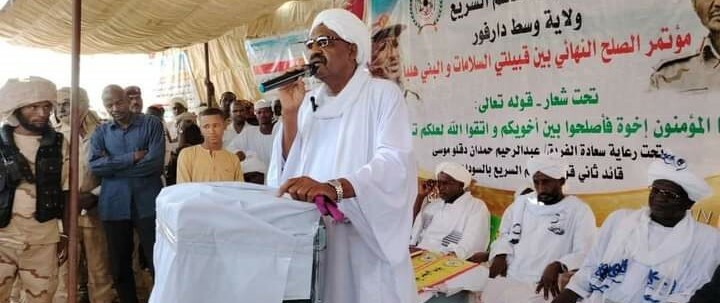In a significant development, the Beni Halba and Salamat tribes on Tuesday signed the final reconciliation document on Monday in the town of Mukjar, Central Darfur State.
The ceremony, under the supervision and patronage of the Deputy Commander of the Rapid Support Forces (RSF), drew attendance from numerous tribal leaders representing Central Darfur State.
This reconciliation marks a crucial step forward following a previous agreement to cease hostilities signed in November of the previous year in Kas. The aim of both agreements was to quell the bloody conflict that had recently erupted between the tribes.
During the celebratory event, Colonel Ali Yaqoub, Commander of the Rapid Support Forces (RSF) in Central Darfur, commended the strong commitment of both tribes to the ceasefire agreement. He noted that any violations were primarily attributed to bandits and highwaymen.
Yaqoub stressed the importance of inviting all tribal administrative leaders to the signing ceremony, emphasizing their role in controlling rogue elements within the tribes known for inciting conflict. He lauded the efforts of tribal administrations in Darfur, recognizing their significant contributions to achieving this reconciliation agreement.
The Beni Halba tribal leader Al-Hadi Dabka stressed the importance of collaborative efforts to control lawless individuals and highwaymen, urging vigilance against those who have caused devastation in Darfur. He called for unity among tribes to address larger issues and common challenges faced in the region.
Bashir Abdulmalik, leader of the Salamat tribe, expressed gratitude to all tribal leaders who played a crucial role in signing the reconciliation document between the Salamat and Habaniya tribes.
Meanwhile, civil society Abdullah Haqar called for an end to the internal disputes between the tribes of the Darfur region for the sake of peace and stability in Darfur.
For his part, Emir Othman Saleh, a member of the reconciliation committee, said that the leaders of the native administration sensed the tragedy of the conflict between the two tribes, adding that the Salamat and Bani Hilba tribes have an extended social and historical heritage of peaceful coexistence and social cohesion, calling on both sides to commit to the reconciliation document they signed.




